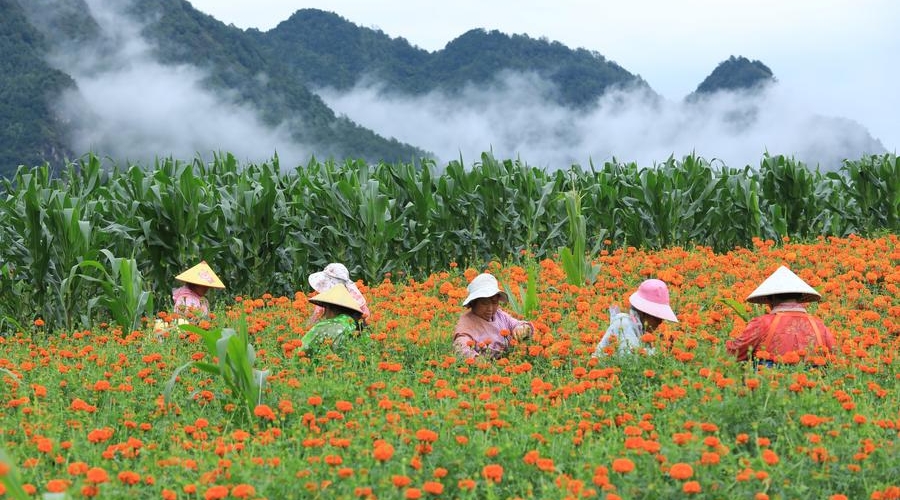
Farmers harvest marigold flowers in Tengchong, southwest China's Yunnan Province, July 21, 2025. [Photo/Xinhua]
Surrounded by orchards heavy with ripening peaches, Lyu Yuxia documents her village life through poetic language and short online videos, which have gained her nearly 1.7 million followers on Douyin, the Chinese version of TikTok.
"Poetry provides spiritual nourishment for me, and I hope to help more people see the real and lovely countryside through it," said the 53-year-old social media influencer, who is from east China's Shandong Province.
Lyu is not alone on her poetry journey. As China promotes agricultural modernization, a rising number of farmers have done away with the need for hard labor, and now have more time to read and write.
As China's first farmer-led poetry organization, Shandong's Chunni Poetry Society has expanded its reach to over 2,000 members in seven provincial regions, and has been holding diverse activities for years, including rural poetry competitions, forums and festivals. Other rural poet organizations have also sprung up across China.

This photo taken on June 10, 2023 shows a reading room in Houbaligou Village, east China's Shandong Province. [Photo/Xinhua]
In northwest China's Xinjiang Uygur Autonomous Region, the number of farmer-poets has grown to more than 150, covering all counties in the Kashgar and Aksu prefectures. In 2023, these farmers released their second poetry collection, titled "Love at Heart," which includes over 200 poems.
"With simple but heartfelt language, they capture the beauty of Xinjiang's villages," said Xiong Hongjiu, secretary-general of the Xinjiang Federation of Literary and Art Circles.
For many farmer-poets, inspiration comes from daily life -- environmental improvements, rising living standards and hardworking neighbours are all vividly depicted in their writing, Xiong said.
From 2013 to 2020, China's poverty-alleviation strategy saw nearly 99 million rural residents emerge from poverty. Stable access to food, clothing, compulsory education, basic health care, safe housing and clean drinking water are now accessible to all Chinese people.
Lei Wen, a farmer-poet from southwest China's Sichuan Province, has been a witness to these rural changes.
Born in the 1960s in Bazhong, a mountainous city in Sichuan, Lei remembers how impoverished his hometown once was. "With blocked transportation, people didn't even have enough to eat or wear," he said.
But now the city has developed into a regional transport hub and locals can drive right up to their doorsteps.

An aerial drone photo taken on Nov. 6, 2024 shows the scenery in Guangwu Mountain scenic area in Bazhong City, southwest China's Sichuan Province. [Photo/Xinhua]
"Green hills, crystal streams, twittering birds and fragrant flowers -- with such abundant inspiration, how could we not write poetry?" Lei asked, adding that as locals enjoy better material lives, their thirst for knowledge and cultural enrichment grows ever stronger.
To consolidate its achievements in poverty alleviation and meet the people's aspiration for better lives, China has adopted a rural revitalization strategy in which cultural revitalization plays an important role.
Chinese authorities are making efforts to revitalize the cultural ecosystem in rural China. They encourage improvements to rural cultural services, urban-rural cultural partnerships and folk cultural activities.
As part of this revitalization work, Nankai University in north China's Tianjin launched a countryside poetry study program in 2021, sending teachers and students to deliver poetry lectures in rural areas across China.
"While guiding rural children to interpret poems through painting or their own words, we hope to plant a seed of poetry in their hearts," said Chen Xiaoyun, a professor of literature at the university.


 Share:
Share: 




 京公网安备 11010802027341号
京公网安备 11010802027341号